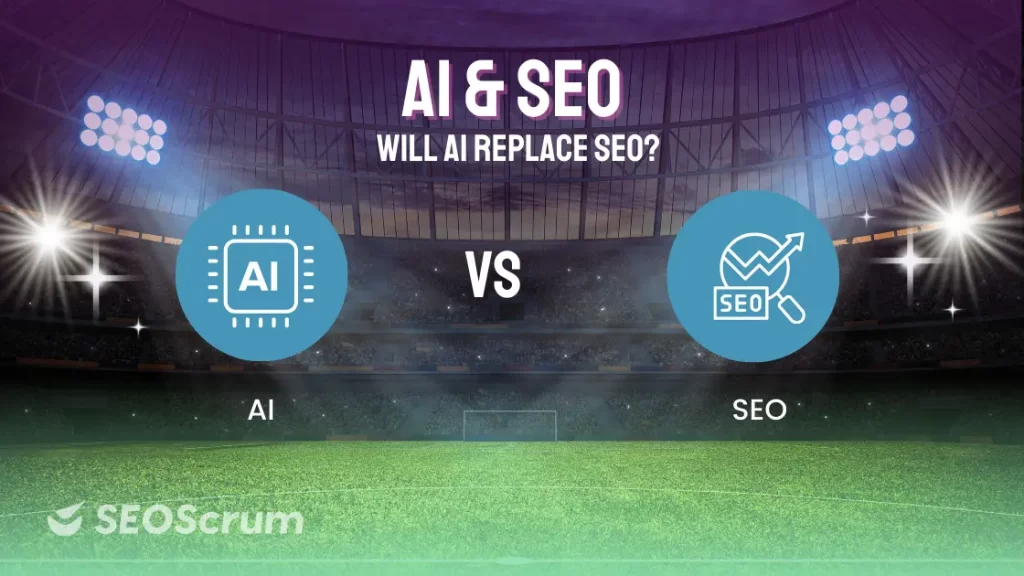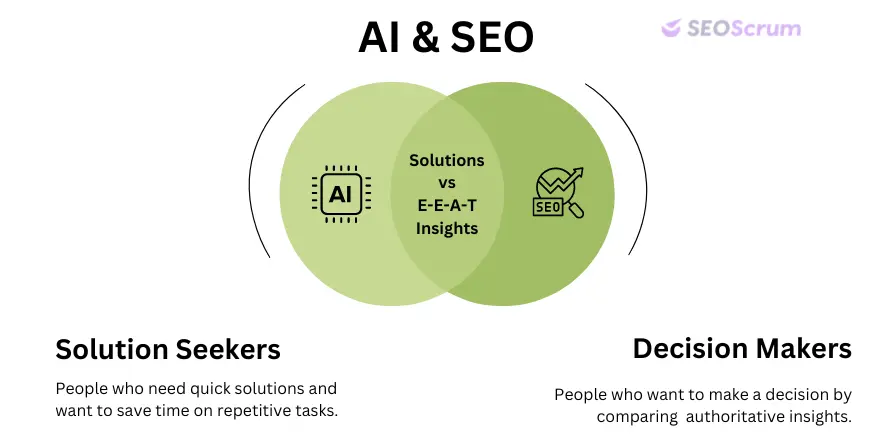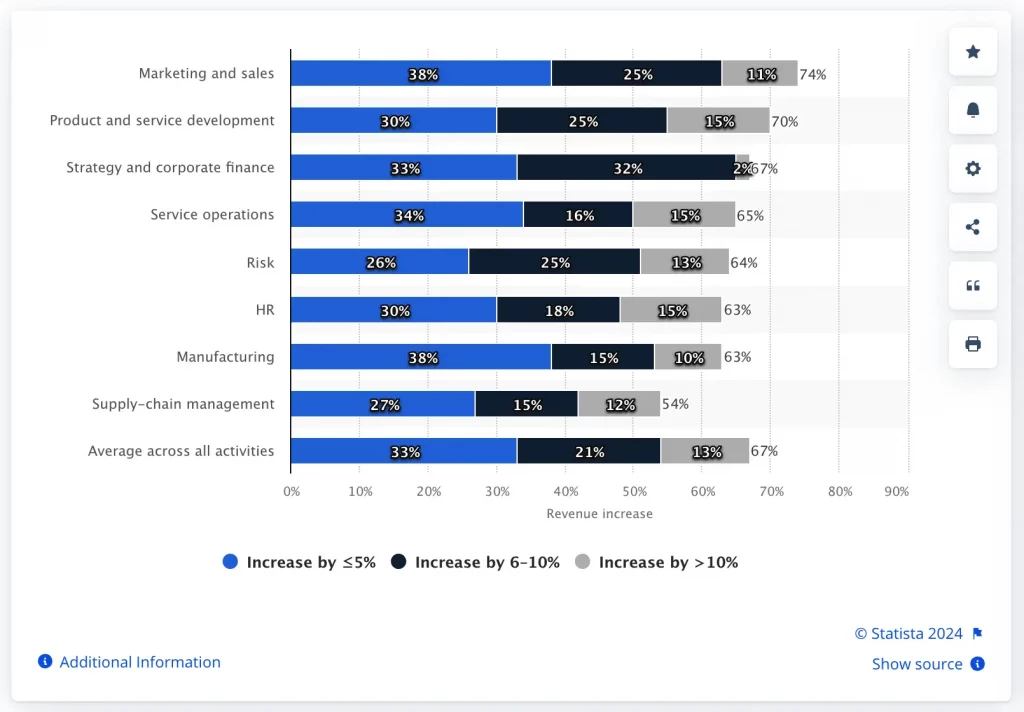AI and SEO: The powerful partnership for the future

The uncertainty about AI and SEO is growing more each day as AI is rapidly transforming the way users engage with search engines.
This is making traditional SEO tactics less effective. Many are not able to either deny it or accept the statement AI has it all.
If AI holds all the answers, is reading this blog a waste of your precious time?
The answer is no. And yes. And maybe…
It depends on who you are. Confused? Look at it this way,
Whether you are looking for answers in search engines or AI.
You come under any of the two sectors of searchers, Solution Seekers, or Decision Makers.
If you are those who evaluate the long-term effectiveness of the solutions you are a Decision maker.
And, if you are a Solution Seeker, you must be constantly searching for immediate solutions and tactics.
Most SEOs themselves are solution-seekers. In recent times, we have many of them using AIs like ChatGPT to clear their queries on SEO.

Does this mean SEOs will get manipulated by AI prompts? Will AI kill SEO?
Keep scrolling to get your queries clarified. That is what this entire AI and SEO blog is about. Let’s find out who survives in the end.
Table of Contents
Generative AI and SEO
To figure out who will survive it’s important to analyze the connection between the two.
AI and SEO are closely linked because SEO is a marketing strategy.
It is the process of helping your target audience find your content easily while searching for it online.
And, AI, in the broader sense, is a technology that mimics human intelligence and is used to drive the way search engines work.
In its earliest versions, AI’s like ChatGPT were limited to the data they had been programmed on, like books, websites, structured data, and others.
Now, with the latest update, these AI’s can analyze, read, and understand the content on the web.
This hints that AI in digital marketing will be a game changer. AI will make its mark by transforming the way businesses connect with customers and shall greatly impact search engine optimization as well.
How will Generative AI impact SEO?
Generative AI is often regarded as a tool that can do wonders like time-saving and workforce-reducing.
Alongside this, AI can prompt strategies and automate processes. We can’t say the threat of AI replacing our careers is completely hypothetical.
Now, we all are familiar with ChatGPT and we have even started using it cautiously to streamline those tasks that once seemed heavy.
Developers are writing codes with it. Data scientists are looking for recent trends. Most of all it doesn’t have employment rights.
So, what causes the chaos? The concern is that there is just a fine line between AI and SEO.
And, even if the line blurs of AI would not aim to replace humans but collaborate with them.
Yes! AI has one prime goal – to perform either laborious or unexciting tasks quicker than humans in a better way. This is a technology that aims to make our work and life easier.
We have already started seeing how effective AI and SEO together could help businesses with increasing revenue.
As per the report for a Global survey by Statista, 74% percent of respondents state that the marketing and sales departments have witnessed more than 5% revenue increases.

Image source: https://www.statista.com/statistics/1083482/worldwide-ai-revenue-increase/
These are quite convincing and more impressive results validating Generative AI and SEO can be the perfect pair.
The future of SEO
The future of SEO using AI is as exciting as it sounds. AI for SEO refers to the art and science of using artificial intelligence tools to improve your visibility, on SERP and pitch your business with your target audience.
For this collaboration to become successful you need to first understand what AI SEO is and why it is important.
What is AI SEO?
Even in major search engine algorithms like Google’s Rankbrain and BERT, Microsoft’s Bing, and Yandex’s Matrix Net, AI has become a core component.
So, if you can understand AI and its impact on search engines you can easily use it in SEO to improve your strategies.
And, a significant part of any SEO strategy is data analysis. For immersive data analysis, AI is an excellent tool.
Using both AI and SEO you can quickly get your tasks done with more efficiency.
Making use of AI-powered SEO software helps you with day-to-day tasks right from sorting out trending topics to identifying content gaps.
Using AI in SEO
AI and SEO are two complex disciplines but when put together, you can see tremendous results, especially with optimizing your site.
Meanwhile, remember one thing about search engines, they prioritize users. Search engines aim to deliver only user-centric content.
That’s the underlying reason why keyword stuffing is not working anymore (It has not worked ever since Google’s Hummingbird update).
This shows that SEO is beyond keywords. And, now it’s about the ICU.
Idea: What is the concept behind the searchers’ query?
Context: What is the intention of the searchers?
User satisfaction: What are the most relevant answers to the search query?
Therefore, for your content to rank, you need to focus on AI and SEO.
You must form a great link-building strategy and optimize your site’s content for AI-powered search engines.
And, AI is one of the best tools that ensures a positive experience for website visitors. Here’s how to use AI to improve your SEO.
How to use AI in SEO – 6 SEO Strategies
1. Keyword strategy with AI and SEO
The competition to rank on SERP keeps growing tougher. You need to find better keywords, refine your topic ideas, and look for other ways that work.
And, the most important strategy in SEO is to find hidden keywords that haven’t been used by your competitors.
This is where AI can be beneficial. You are accessible to powerful AI-powered SEO tools. These tools can provide you with immersive keyword insights.
Using such advanced software you can identify potential keywords. Such keywords are hidden opportunities that your competitors are not aware of.
They can maximize the chances of your site ranking on SERP.
2. Create and optimize content using AI and SEO
Identifying hidden keywords that lead to discovering content opportunities is just one step to dominating the SERPs.
The next major strategy you need to focus on is creating effective content. And, AI shall help you get it done quickly
All you need to do is to let AI know the keyword and what kind of content you need.
AI-powered tools will come up with the content after searching the web for information relevant to that keyword.
You can then work on the content, fact-check the content, and personalize it for your audience. Then move on to optimize it.
And, optimizing content is something beyond keywords, internal links, backlinks, and other on-page SEO tactics.
Google EEAT and Helpful Content Update, guidelines made it clear that the search engines have become smarter. They don’t look for indicators but choose content that meets users’ intent.
And, by using AI you can create topic clusters for user queries and develop content that answers those queries authoritatively.
3. On-page optimization with AI and SEO
Using AI for technical SEO audits will help you identify and solve technical issues.
This in turn will increase your site’s crawl ability, increase the loading speed, and improve the overall user experience.
Along with this, you can analyze your existing content and get suggestions on areas of improvement with the changing trends.
You can alter the structure, refine meta descriptions, optimize title tags, etc. based on the appropriate suggestion for better SERP visibility.
4. Link building and outreach with AI and SEO
Make the best use of AI to Analyze your competitors’ backlink profiles.
Doing so you can get a sneak peek into their strategies and figure out their link-building opportunities.
Moreover, you can make use of AI to generate targeted outreach emails.
This strategy lets you connect with partners and influencers and in turn increases your chances of acquiring high-quality backlinks.
5. Voice search optimization with AI and SEO
When SEO and search are inseparable you should note that voice search is among the fastest-evolving areas of search.
We have a decent number of users who rely on their voice-activated devices to search the internet,
And, the number of such voice assistants is expected to reach 8.4 billion globally in the next few years.
So, voice SEO (VSEO) is now an aspect of SEO that can’t be ignored.
Using AI you can also create VSEO-optimized content. AI will give you the queries that searchers voice out the most and you can then create content around these questions.
AI is said a combination of machine learning and many Natural Language processing approaches.
This combination makes it possible to use tools like Grammarly and Hemmingway and create more conversational content by recommending tone changes.
6. Improve UX and page experience with AI and SEO
Any search engine’s primary focus will be users. This makes user experience(UX) a vital part of any SEO strategy.
Hope you now realize what made Google hint to people about page experience becoming a significant ranking factor back in 2021.
In simple terms, page experience is a set of signals used to measure user behavior (satisfied or not) while interacting with a web page.
Of course, pages with negative user experience can’t rank.
So with AI-powered SEO tools, you can get suggestions on what you can do to improve your website’s UX.
AI and SEO are a perfect match that can help you to scale up with effective strategies if used well. These are such effective SEO strategies that work.
Similarly, as I stated before AI is a tool and strategies can backfire if exploited. Here’s my take on what not to do with AI for SEO.
How will AI affect SEO?
5 Don’ts in Using AI for SEO
1. Don’t use AI for SEO without a plan
AI and SEO are complex identities. AI is a tool with clear goals and guidance. Though it has it all it cannot do anything on its own.
While using AI for SEO, you will fail if you don’t set specific SEO objectives and KPIs for your AI tools.
Not exploring the tool’s advanced filters and being generic with your prompts would lead to undesirable outcomes.
2. Don’t ignore other advanced SEO tools
You have highly advanced SEO tools and content solutions that are more profound than many AI-centric tools.
AI is a growing technology so many tools may yet have to leverage with time.
These tools and your other go-to business resources, namely HubSpot blogs can provide you with authorized information.
Not all free version AIs will give you real-time data. Some lack up-to-date data. So never ignore advanced SEO project management software and popular SEO tools like such as Ahrefs, Moz, and Semrush for a reason.
3. Don’t ignore your expertise.
AI with Machine learning may be growing now but your expertise is far more important.
Try to make use of your expertise and not blindly believe what AI suggests.
Not analyzing the AI suggestions with your level of expertise before executing may lead to providing false data or following an irrelevant strategy.
Pro tip:
AI suggestions work only if your prompt is right.
The following prompt works with Google AI Gemini but not in the Free Version of ChatGPT
Prompt:
Please analyze the text on [insert URL] and recommend other keywords I should target on this page that are related to [insert the keyword that page already targets] that I am currently not targeting.
4. Don’t let AI be your SEO expert
AI may do wonders but it isn’t a magic tool. You can’t blindly follow the suggestions and expect an instant uproar in your SEO impacts.
You can use it to make informed decisions and streamline your process.
Be it a content need or Keyword analysis you can’t feed the prompt and make use of what you get.
Doing so you will remain either hidden in Google’s pages from 2 to 100 or may not show up on Google at all.
5. Don’t forget SEO in the first place!
You are using AI for SEO. SEO is your core strategy for marketing. Using AI find opportunities to scale up your SEO.
Make the best use of AI-powered SEO tools to help you ease tasks. Every time you follow a suggestion make sure you are not dedicated to AI.
How not to make use of AI for SEO is more important than how to do it.
And, having read so far about AI and SEO do you still fear?
Will AI replace SEO?
There is so much hype about Artificial Intelligence (AI) replacing the marketing strategy search engine optimization (SEO).
On the contrary, I don’t see AI and SEO like the rest. Any AI like chatGPT is just a tool that helps to streamline processes and make decisions.
Good that you decided to google the query, Will AI replace SEO and end up reading this blog? I tried asking the same to ChatGPT and here’s what I got

Therefore, AI and SEO are much like a fire: You can use it carefully and benefit the most or it may lead to destruction. It all depends on the way you use it. The replacement buzz is just a myth.
AI will Replace SEO: Myths Busted
SEO (Search Engine Optimization) will continue to be relevant even after the advent of AI (Artificial Intelligence). AI and SEO will have a mutual bond.
AI grows fast changing various aspects of technology and business. Despite changing trends, SEO shall continue to be the key to website optimization. Here’s why:
- Search Engine Algorithms: Though search engines depend on AI they don’t completely rely on it. Search engines including AI-run search, still depend on algorithms to understand and rank web content. SEO helps to optimize websites to make them visible to these algorithms, and relevant to search engine users.
- User Intent: SEO focuses on providing users with results by understanding their intent. This is the key as AI aims to help user experience and deliver more personalized search results. SEO helps businesses optimize their website for user intent, and pitch them to the right audience.
- Content Optimization: AI may help search engines better understand and interpret content, but they cannot effectively optimize content in which SEO plays the key role. SEO gains an upper hand in making your site look healthy by optimizing on-page elements, improving user engagement signals, and a lot more.
- Voice Search: With the rise of AI-powered voice assistants and voice search, SEO is even more important. Voice queries aren’t as same as traditional text-based queries, and SEO strategies need to adapt to suit voice searches. To lead in voice optimization just optimize content for voice search queries, using conversational language, and focusing on long-tail keywords.
- Technical Optimization: SEO involves technical aspects too. It optimizes for website structure, mobile optimization, site speed, and crawlability. These factors play a vital role in search engine indexing and overall user experience. AI may improve the way search engines understand and analyze technical factors, but for sure AI cannot optimize websites to make them accessible for search engines and users.
- Competitor Analysis: SEO allows and aids a lot with competitor analysis. It lets you discover opportunities and stay on top in search engine rankings. Meanwhile, AI can only make the process of analysis better. The insights gathered from the process need SEO expertise to make informed decisions.
Therefore, AI and SEO will co-exist but not replace one another.
AI will keep growing and will impact the future of technology, business, and SEO
SEO shall always be an effective and helpful marketing strategy for businesses to improve their online visibility and drive more organic traffic.
Stop your queries on AI replacing SEO and start investing in advanced SEO project management software that supports your team presently, and fits into the future by seamlessly blending with AI space.
Stop your queries on replacing and start both AI and SEO to create a powerful strategy that could make you visible.
AI will never kill SEO or replace it. AI and SEO together fuel the future of digital marketing.

